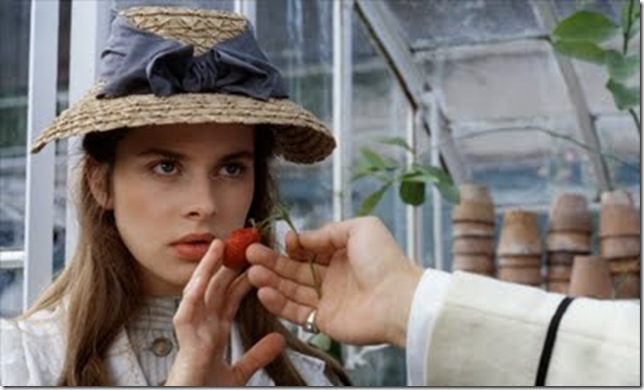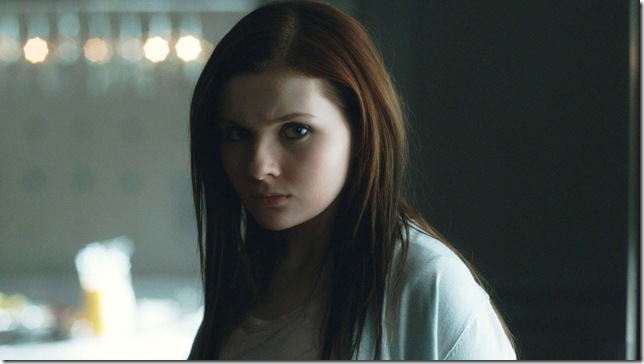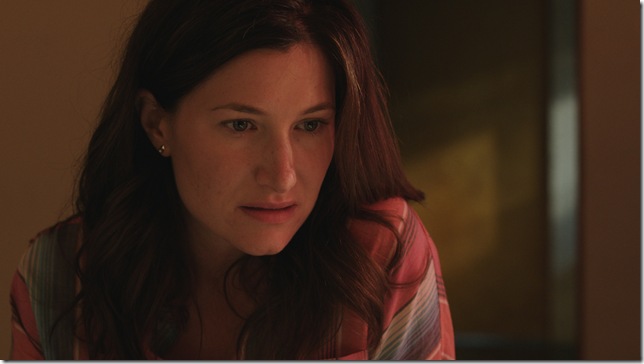Tess: One of the most sumptuously photographed films of Roman Polanski’s career, 1979’s Tess (Criterion, $34.99 Blu-ray + DVD) opens its Victorian-era narrative by conjuring none other than John Ford, as soaring music colors a majestic CinemaScope landscape. This is a film whose images burst at its own golden seams, and its use of wide-open spaces remains arguably unparalleled in Polanski’s canon. But the irony is that its title character remains trapped in a patriarchal prison wherever she goes, placing this faithful adaptation of Thomas Hardy’s Tess of the D’Urbervilles closer to the claustrophobic, psychologically tortured milieu of Repulsion and Rosemary’s Baby than it initially seems.
Nastassja Kinksi, in one of her earliest roles, plays Tess, the comely daughter of John Derbyfield, a village louse who is suddenly informed that he’s the last in a line of an aristocratic family, the D’Urbervilles. Tess is soon dispatched to a country estate operated by fellow D’Urbervilles, in hopes that these distant “cousins” will share their fortune. Thus begins a spiral that sends Tess into the arms of two men, both of whom treat her like property in one way or another. The movie’s Oscar-winning romantic qualities have long been espoused, but its feminism is unsung: It’s about a girl who resigns herself to a fate of abuse and drudgery, exchanging comfort for self-determination in a hypocritical, male-dominated world.
At three beautifully paced hours, Polanski skips right over the births, deaths and murders that other filmmakers would treat as the movie’s benchmarks, instead focusing on the comparative minutiae of milked cows and plowed land — the sights and sounds and smells of Tess’ hardscrabble life. Through it all, Kinski is an inexpressive cipher, a bloodless blank slate — until you realize that it’s not bad acting. It’s the character accepting her destiny with Christ-like equipoise, which makes the movie’s fatalism all the more tragic.
Like most top-shelf Polanski, Tess is beautiful, disturbing and unshakeable, and it’s worth nothing that the Blu-ray transfer is one of the most gorgeous I’ve seen from Criterion. The copious extras include a 2006 documentary about the making of the film, three additional featurettes, a 1979 interview with Polanski and a 45-minute French documentary shot on the movie’s set.
Wadjda: The first film shot entirely in Saudi Arabia — and by a woman, no less — Haifaa al-Mansour’s Wadjda (Sony, $29.96, Blu-ray + DVD) is an illustrative crowd-pleaser that shines a spotlight on the myriad double standards that relegate women to second-class citizens in the director’s native country.
It does so largely through the eyes of a child, continuing the metaphorical kid-on-a-quest paradigm that dominated Middle Eastern cinema in the ’90s in films like Where Is the Friend’s Home, The White Balloon and Offside. In Wadjda, the child in question is the title character, a wiseacre raised, essentially, by a single mother (because her mother has not and cannot bear him a son, Wadjda’s classy father has been considering marriage proposals from other women).
Played with astonishing openness, vulnerability and streetwise wisdom by first-time performer Waad Mohammed, Wadjda speaks without a filter — she’s a voice of rebellion, a crafty capitalist and a defier of any and all cultural traditions. Her quest is to buy a bicycle, an affront to a patriarchy in which girls and women are prohibited from driving, wearing open clothing, singing in front of men, playing in front of men, and doing just about anything in front of men except, one assumes, cooking meals.
It’s hard to avoid comparisons to De Sica’s Bicycle Thieves, which similarly drew inspiration from on-location shooting and its symbolic focus on the search for a bike. But al-Mansour’s film casts a wider net, as Wadjda’s quest is also an existential one: She sees that her name has been excluded from her father’s family tree, which allows only a male lineage, and she wants to leave an impact that goes beyond her desire to race her best friend on a bike. She wants her presence known, accepted and loved. It’s a wonderful message and a pretty terrific, if ultimately sentimental, window into a suppressive world.
Haunter: Vincenzo Natali’s Haunter (IFC, $9.96, Blu-ray or DVD) wastes no time letting us know his film is set in the ’80s. A Walkman, a Rubik’s cube, Pac-Man and Murder, She Wrote are all referenced within the first seven minutes, to accompany the images of Ronald Reagan on TV and the British New Wave posters on the wall of its lead character, 15-going-on-16-year-old Lisa (Abigail Breslin). She’s one-fourth of a perfect nuclear family — a bit too perfect, in fact, but if they all just seem to be going through the motions, there’s a perfectly profound reason for it.
That’s about all one can say about the plot, whose first spoiler hits us like a 2-by-4 just a half-hour into the film (like in Psycho!), and after that the spooky revelations keep coming with a nerve-rattling relentlessness. Natali, the Canadian-American auteur behind Cube, Nothing and Splice, is one of the most creative genre filmmakers on the planet, frequently releasing projects that beautifully toy with our notions of time, space and reality as we know it. This metaphysical chiller is no exception; it’s stuffed to the brim with ideas, blenderizing concepts from Groundhog Day, The Others, Donnie Darko and Alice in Wonderland into a horror film that somehow feels utterly original — and frightening to the core.
As spectators to this spectacle, our eyes deceive us in ways that frequently upend everything we think we know about the way the world works, and we’re constantly overcome by the thrill of not knowing what’s coming next. Like Natali’s previous films, it’s too esoteric for a mainstream audience but will surely be remembered as a cult classic.
Afternoon Delight: Afternoon Delight (Docurama, $22.96 Blu-ray + DVD) probably isn’t the latest hard-R comedy to fumble its way toward enlightenment in the shadow of Judd Apatow, but it’s at least the latest to hit home video. In particular, it channels the same sort of middle-aged malaise Apatow chronicled so accurately in This is 40.
The film’s married couple, Rachel and Jeff (Kathryn Hahn and Josh Radnor), is raising a child and have not had sex in months. To spice things up, they visit a “gentleman’s club,” where Jeff pays a stripper (Juno Temple) to entertain his wife. The adventure doesn’t lead to bedroom fireworks, but, through a calculated coincidence, Rachel bumps into her lap dancer the following week; turns out her name is McKenna, and she conveniently needs a place to crash for a few days. And did she mention she does tricks on the side? Thus begins a discomforting friendship predicated, on Rachel’s part, on the oldest cliché about the world’s oldest profession — the well-meaning but judgmental desire to “save” a hooker and elevate her life to better things.
As a comedy, Afternoon Delight is limp, its humor provided largely by flocks of housewives speaking explicitly and nastily about sex, a tactic that lost its power to shock by the second season of Sex & the City. Filmmaker Jill Soloway, who penned a few episodes of the masterful Six Feet Under, is a better director than she is a writer — the eroticism she brings to sexless massage scene between its two main female characters is enough to warrant a cigarette, and it makes for a strong counterpoint to the complete de-eroticization of the sex scenes, which reflect Rachel’s anxieties and lack of libido. Most male directors would shoot these scenes much differently.
The movie’s narrative is programmatic and too elliptical to surprise, but Soloway draws fine work from her ensemble (including Jane Lynch as Rachel’s oversharing therapist), leading toward a climax that brings out everyone’s true nature in ways that are pathetic and inevitable, but wholly real. The former indie-rock musician Craig Wedren provides the film’s droning, ambivalent score.



